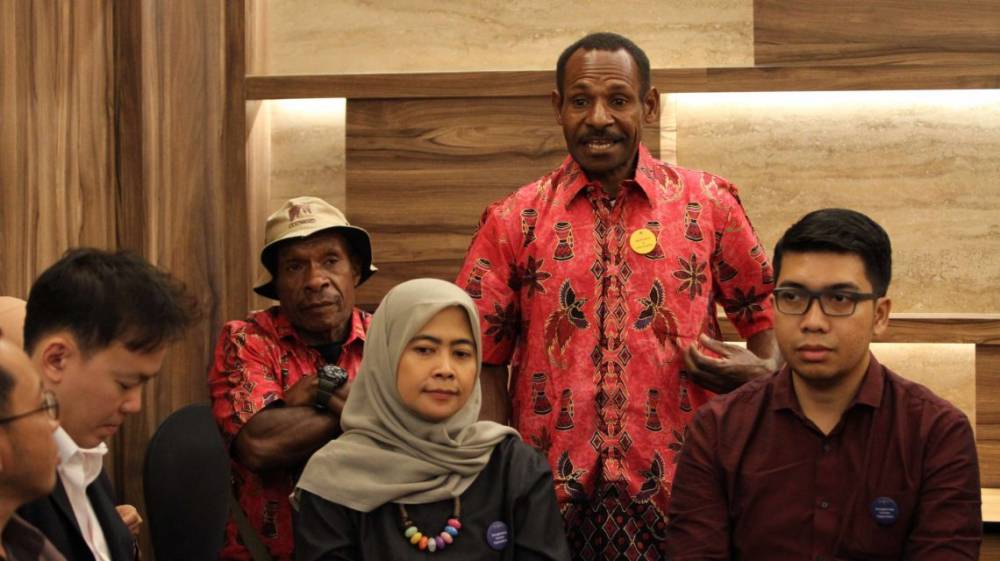WORKSHOP ON AGROFORESTRY AND INTERCROPPING
Jakarta (Indonesia), 26 April 2019 – SCOPI secretariat organised the workshop as back to back event with Members Working Meeting. The workshop served as a platform to carry out SCOPI roles as convener and to encourage members, partners, and stakeholders to actively contribute their ideas on linkages between sustainable coffee production and deforestation.
Attended by 22 participants from members, partners, and stakeholder, the workshop welcomed the attendance of resource persons such as Mr. Ayi Sutedja (Gunung Puntang Cooperative), Mr. Irwan Gunawan (WWF Indonesia), Mr. Daniel Budi Cahyono (Perum Perhutani), Ms. Retno Hulupi (Researcher), moderated by: Mr. Fitrian Ardiansyah (IDH the Sustainable Trade Initiative), and minutes of meeting is provided by Ms. Leony Aurora (SCOPI Advisory Board).
Mr. Daniel Budi Cahyono presented what deforestation is, how WWF creates options and provides solution. Since 2007 WWF has implemented a program in Lampung where of the approximately 2,000 who were assisted, only 20% were able to obtain certification.
Agroforestry and intercropping main objectives were to discussed issues associated with assumption that agriculture practices and forest conservation can go hand in hand with proper planning by considering bioderversity conservation. WWF representative presented the workshop with few findings on the corelation between coffee farming as a major driver for deforestation by removing significant amount of forest cover and increasing the number of possibilities on deforestation, poaching, and human-animal conflict.
In practise the effort to relocate farmers or people in the forest are easier said than done. SCOPI is hoping for this discussion will serve as positive outlet and to boost cooperation between multi stakeholders to further avoid environmental damage while conserving and increasing biodiversity in the places we no longer can call natural forest.
The following topic have been addressed by Agroforestry and Intercropping:
- How to avoid making preedence for further breaching of national parks or protected fores
- How to maintain forest that already farmed
During the workshop the participants shared their success stories and provided recommendation on agroforestry. Representatives from PERUM Perhutani, Indonesia State owned Forestry Company stated that several coffee farming in the forest has yet to implement good and well-balanced coffee cultivating practices. PERUM Perhutani tries to boost the process of forest recovery and suggested a strong value chain to increase the demand of sustainable coffee as the driven force to decrease the poor practices in agroforestry.
An expert in coffee cultivation, Ms. Retno Palupi pitched in with her opini that there are factors that could play a part in increasing productivity without farmers needing to expand or deforest in order to produce more beans. These factors could include planting and or researching the best coffee variety with high yield performance and that are climate resistant, others include the harvest practice, processing and storage. Last but not least, intercropping with other cash crops are proven to be beneficial and can fortify farmers’ income security. There is a need to invest in such research that could give back valuable information to farmers on intercropping practices that can be adjusted to their local context.
There are benefits of having groups of responsible farmers, with the right incentive to maintain biodiversity in their permitted agriculture land. What though, the most logical and beneficial agroforestry model that is proven to be sustainable in the long term, what is in the detail? Who are the stakeholders that have responsibility to control, to provide permits, to regulate, to monitor and implement? Whose responsibility is it to know, to approach and to initiate multi-stakeholders collaboration
Agroforestry and Intercropping workshop provided the following recommendation/action plan:
- Study of the relationship between deforestation and coffee is needed to find out whether coffee is the driver of deforestation. The study needs to involve credible institutions.
- Developing the Agroforestry model as an answer to the problem of deforestation by considering several aspects:
- Technical aspects such as rorak and others
- Aspects of land legality related to regulation, forest functions, etc
- Business aspects of how SCOPI and coffee stakeholders intervene in coffee-producing area, especially those near or inside forest areas.
Finally, SCOPI is certainly part of the suggestions from this session that SCOPI can play a role in establishing said forum or to convene actors that have interests in coffee and sustainability.
Presentations:
Ibu Retno Hulupi_Budidaya Tanaman Kopi Sistem Tumpangsari atau Wanatani
Bpk. Irwan Gunawan_Coffee Forest Conservation Better Coffee Project di Bukit Barisan Selatan
Daniel Budi Cahyono_Strategi Pengelolaan Tanaman Kopi Dalam Kawasan Hutan

